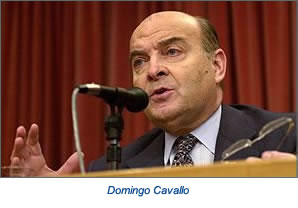
Domingo Cavallo, former minister of the economy in Argentina, spoke on September 26 on the topic, “The Financial Crisis in Europe: Lessons from Latin America.” He is credited with leading his country out of a financial crisis in 2001 by instituting the “Convertibility Plan,” which set the dollar-peso exchange rate at one peso per U.S. dollar, reducing rampant inflation to near zero. The talk was sponsored by the Jackson Institute.
In his talk, Cavallo said excessive leverage is the root of the financial crisis both in Europe and in the U.S., adding that the U.S. addressed the problem with deficit spending to recapitalize the banks.
“There is no Latin America experience on the ‘U.S. solution’ for the financial crisis, simply because no Latin American country did ever have a reserve currency, and Latin American debts have never been seen as reservoirs of trust,” he said.
He said the situation was different in Europe, for, even though the euro had been created in 1999 and was seen by some as a competitor to the dollar as a reserve currency, “What all of them overlooked is that those financial obligations, even though issued in Euros, were not European but national.” He said that if decision makers in Europe “had realized that each country was responsible for its own debt – and not Europe as a whole – the interest rates applied to the debt of each individual country would not have converged as fast as they did, and the availability of credit for the periphery of Europe would not have been as abundant as it was. But the reality is now that the countries in the periphery became excessively indebted and they cannot pay what they owe.”
Cavallo said Europe could have followed the U.S. approach if the national debts were transformed into debts guaranteed by Europe as a whole and not by each individual country, but that would have necessitated first creating a political union of the individual European states, which did not happen.
“It is here where the Latin American experience becomes relevant,” he said. “The Argentinean experience of 2001 is the one that more closely resembles the problems that Greece is facing nowadays.”
He noted that American economist Nouriel Roubini, citing Argentina’s experience, recommended that Greece “should default on its public debt, abandon the euro and reintroduce the drachma at par. Then it should let the drachma be devalued as much as necessary to restore competitiveness and growth.”
But Carvallo said he completely disagrees with that analysis. “If Greece were to adopt that decision, the markets would predict that Portugal, Ireland and even Italy and Spain will be forced to do the same, and Europe would be in a situation like that of Latin America in 1982, when the default of Mexican debt provoked large devaluations and defaults on several other Latin American countries,” he said. “What came next into Latin America is well known: stagflation, hyperinflations and all the associated miseries of what was called the ‘lost decade.’”
He said the solution for Europe is to move gradually toward fiscal integration, while allowing the individual countries to maintain their sovereign powers.
Carvallo added that he doesn’t agree with the argument that opposes issuing European debt because that would overly burden the taxpayers of the more solvent countries. “The counter argument is that the burden will be much higher” if all these countries abandon the euro and create a disorderly default on their debts.
